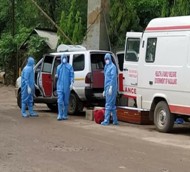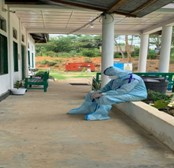FRIDAY, SEPTEMBER 19, 2025
- Home
- Chronicles of the Frontline Covid Era Healthcare Workers
Chronicles of the Frontline Covid Era Healthcare Workers
During the peak of the COVID-19 lockdown in 2020, Nagaland Government, faced with an unprecedented health crisis and acute shortage of manpower
Share
1. Extraordinary Circumstances: During the peak of the COVID-19 lockdown in 2020, the State Government, faced with an unprecedented health crisis and acute shortage of manpower, took an extraordinary policy decision to create posts for medical officers, nurses, technicians for immediate public service requirements.
2. Due Process of Recruitment: It may be noted that the government had issued open advertisements through newspapers during 2020, however only few responded, following which candidates who had applied were examined by competent authority, interviewed and duly selected.
3. Nature of Appointment and Service Rendered: The selected doctors, nurses and technicians were assigned frontline COVID-19 duties across PHCs, CHCs, and district hospitals during the pandemic, and their services continued to be utilized post-pandemic owing to the ongoing need in the public healthcare sector.

4. Regularisation as a One-Time Measure: The State Government, appreciating the sacrifice and service rendered by these health workers, exercised its power to relax the existing service rule to regularise the service of doctors through SRD as a One-Time special measure, with the objective of ensuring continuity of healthcare services. The Court reaffirmed that the government is well within its statutory right to relax or amend service rules under exceptional and extraordinary circumstances in larger public interest.
5. Lack of Locus Standi: The High Court in its judgement on 01/08/2025 stated the petitioners lacks Locus standi as they are not applicants of the 2020 recruitment drive, being students and therefore ineligible at that point of time. Since they were not similarly situated persons, they could not claim discrimination or deprivation of rights.
5. Contextual Interpretation: The decision must be understood in the backdrop of pandemic exigencies, where the primary objective of the State was to ensure uninterrupted delivery of healthcare services to the public.
6. Alignment with Central Government Policy: Note that the State’s action was in consonance with the recommendation of the Central Government to give preferential consideration to COVID-19 frontline health workers in matters of services regularisation.

7. No Challenge to 2020 and 2021 Appointments: The fact is that the student body and petitioners did not challenge the initial COVID19 appointment in 2020, which form the basis of the present regularisation. Hence, the current opposition amounts to an afterthought.
8. Future Opportunities for Students: The medical students and aspirants remain free to compete for government service as and when fresh advertisements are issued. However, they cannot invalidate a policy decision taken during an extraordinary crisis such as pandemic to safeguard public health.
9. The Government as Employer: The State, having utilised the service of its employees in time of public emergency, is responsible for the welfare of its employees and bound to reciprocate with continuity and job security. Therefore, the employees have a legitimate expectation.
10. Differentiation between Aspirants, Opportunist and in Service Healthworkers: There is a clear differentiation between these categories and merely to accommodate the demands of the aspirants, the state cannot leave behind those who have proven their competency, credibility and skill with those who haven’t proven themselves, equals have to be treated with equals and unequals differently.
The bonafide intention of the Government, in creating additional posts and making emergency appointments during the unprecedented crisis of the COVID-19 pandemic, must not be misconstrued or mischaracterised as an act of corruption.
Such measures were undertaken in the larger public interest, with the sole objective of ensuring continuity of essential health services at a time when the entire system was under extraordinary strain. The Government acted with urgency to safeguard the lives of citizens, and these actions were necessitated by the prevailing circumstances, not by ulterior motives.
It is not wrong for the State as the largest employer to ensure job security for those who have already given our service at a time when we were called to serve, we did so without asking the nature of work, as the situation demanded.
The question before us today is not of confrontation but of conscience; today the very health workers who were the first and last line of defence stand vulnerable and threatened by uncertainity as new aspirants demand their share and their rights.
Does the frontline healthworkers have a right too for dignity and security in service without being viewed as opportunists?
Having served the State faithfully during and after the pandemic, the healthcare workers have a legitimate expectation that their service would be recognised not just in words but in deeds and appeal to the conscience of the society to reciprocate favourably.
Covid Era Frontline Healthcare workers

